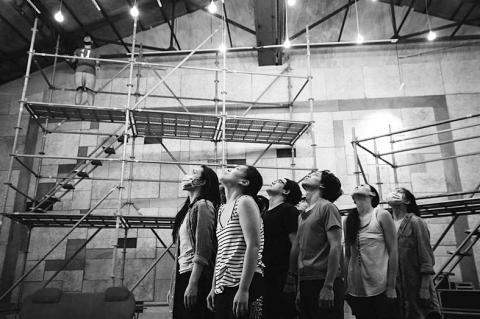German playwrights seem to be all the rage these days in Taipei theatrical circles. Last weekend it was the Contemporary Legend Theatre (當代傳奇劇場) with Johann Wolfgang von Goethe’s monumental Faust, and this weekend Against Again Troupe (再拒劇團) offers a musical based on Frank Wedekind’s Fruhlings Erwachen (Spring Awakening, 春醒).
Against Again Troupe was founded in 2002 by a group of aspiring young theater workers who wanted to form a community to produce works that focused on society’s ills.
With Wedekind’s groundbreaking 1891 play, the group seems to have found the perfect vehicle.

Photo Courtesy of Against Again Troupe
The play, which explores the sexual repression of the 19th century Germany and youthful rebellion, was once banned because of its scenes of homoeroticism, rape and suicide. Today, howerver, it is considered a seminal work in modern theater.
In the US, Duncan Sheik and Steven Sater turned it into a rock and roll musical, Spring Awakening, which won eight Tony Awards, including Best Musical, in 2007.
Against Again Troupe’s musical, directed by Huang Yuan-wen (黃緣文) with Huang Si-nung (黃思農) and Chiang Tao (蔣韜) as the musical directors, opens tonight for five shows.
The show focuses on the relationships between Melchior and a naive girl, Wendla, who fall in love and are anxious and curious about their own bodies and sexuality, while their suicidal friend Moritz is struggling to live up to society’s expectations.
Given the subject matter, there is a parental discretion warning.
■ Tonight through Sunday at 7:30pm, tomorrow and Sunday at 2:30pm
■ Taipei City Government Family Theater (台北市政府親子劇場), 2F, Taipei City Hall, 1 Shifu Rd, Taipei City (台北市市府路1號2樓)
■ Tickets are NT$1,000 to NT$2,000 and are available at NTCH box offices and other ticketing outlets, online at www.artsticket.com.tw and at convenience store ticketing kiosks. Sunday’s matinee is almost sold out

In the March 9 edition of the Taipei Times a piece by Ninon Godefroy ran with the headine “The quiet, gentle rhythm of Taiwan.” It started with the line “Taiwan is a small, humble place. There is no Eiffel Tower, no pyramids — no singular attraction that draws the world’s attention.” I laughed out loud at that. This was out of no disrespect for the author or the piece, which made some interesting analogies and good points about how both Din Tai Fung’s and Taiwan Semiconductor Manufacturing Co’s (TSMC, 台積電) meticulous attention to detail and quality are not quite up to

April 21 to April 27 Hsieh Er’s (謝娥) political fortunes were rising fast after she got out of jail and joined the Chinese Nationalist Party (KMT) in December 1945. Not only did she hold key positions in various committees, she was elected the only woman on the Taipei City Council and headed to Nanjing in 1946 as the sole Taiwanese female representative to the National Constituent Assembly. With the support of first lady Soong May-ling (宋美齡), she started the Taipei Women’s Association and Taiwan Provincial Women’s Association, where she

Chinese Nationalist Party (KMT) Chairman Eric Chu (朱立倫) hatched a bold plan to charge forward and seize the initiative when he held a protest in front of the Taipei City Prosecutors’ Office. Though risky, because illegal, its success would help tackle at least six problems facing both himself and the KMT. What he did not see coming was Taipei Mayor Chiang Wan-an (將萬安) tripping him up out of the gate. In spite of Chu being the most consequential and successful KMT chairman since the early 2010s — arguably saving the party from financial ruin and restoring its electoral viability —

It is one of the more remarkable facts of Taiwan history that it was never occupied or claimed by any of the numerous kingdoms of southern China — Han or otherwise — that lay just across the water from it. None of their brilliant ministers ever discovered that Taiwan was a “core interest” of the state whose annexation was “inevitable.” As Paul Kua notes in an excellent monograph laying out how the Portuguese gave Taiwan the name “Formosa,” the first Europeans to express an interest in occupying Taiwan were the Spanish. Tonio Andrade in his seminal work, How Taiwan Became Chinese,